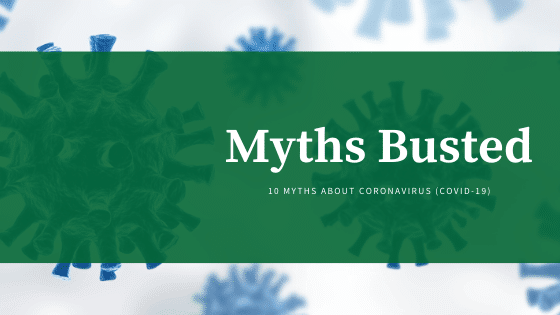10 Myths About Coronavirus
There is plenty of false information out there regarding the novel Coronavirus. We tried to find 10 common myths about coronavirus and get the facts for you.
1. Hot weather will kill the virus
This is the number one myth most people in the DFW area are talking about as we get into the warmer seasons. Being in a warm place doesn’t affect your risk of infection. In fact, the virus has already spread to areas of the world with hot temperatures. It is true that sunlight does kill virus, but we don’t know the amount needed to kill the coronavirus. As of now, it’s unlikely that warm weather will affect our cases in DFW.
2. You should scrub down your groceries and mail
There are some people out their recommending you scrub down all of your groceries and mail due to the coronavirus being able to survive up to 24 hours on cardboard. At this time, the FDA says there is no evidence of the virus spreading through food or food packaging. The virus mostly spreads human to human. For now, don’t worry about scrubbing down your groceries, instead simply wash your hands well with soap and water after shopping or grabbing your mail.
3. Cats and Dogs spread Coronavirus
Right now, this is a hot topic among scientist. As of today, there is little evidence that cats and dogs can spread the virus. The CDC says some coronaviruses that infects dogs and cats can be spread to humans, but this is incredibly rare. More studies are needed to determine this myth but for now, treat your pets like humans and make sure they maintain their social distancing from other pets and humans.
4. Rinsing the nose with saline protect against coronavirus
While rinsing your nose with saline can help to alleviate symptoms of allergies and chronic sinus infections, there is no evidence that it will prevent respiratory infection. In fact because the virus lives up to three days on plastic surfaces, some providers are recommending you avoid sinus rinses at this time.
5. Home remedies can protect you against COVID-19
Stocking up on Emergen-C packets doesn’t seem to be the answer at this time. Right now, there is no evidence that bumping up your vitamin C intake will help to decreases the risk of getting the Coronavirus. While people with a vitamin-c deficiency are more at risk to infections than healthy individuals. It’s important to know that vitamin-c deficiency is rare in the United States.
6. Wearing Gloves when you go out decreases the chance of infection
All healthcare workers generally wear latex gloves to protect themselves with caring for people. Because gloves can become contaminated easily, healthcare providers routinely change gloves washing their hands between. Meaning, wearing gloves in public doesn’t decrease your chances of contracting the virus. Leave the glove to the professionals working on the front line and focus on not touching your face after going out and routinely washing your hands with soap and water.
7. Only older people are at risk for Coronavirus
It is true that the coronavirus is most likely to affect older Americans with underlining health conditions like asthma, cancer, diabetes and heart disease. But anyone is at risk for contracting the virus. In some states more than half of the cases for coronavirus were in patients in their 30’s, 40’s and 50’s. It’s important that all ages continue to practice smart social distancing to decrease your chances of contracting the virus.
8. The coronavirus is airborne
Late last month the World Health Organization released a statement saying that there is not enough evidence to suggest that the Coronavirus is airborne. Meaning you cannot get the virus by simply breathing the same air as an infected person. Health officials with the CDC say that most common way to contract the virus is from person to person contact with someone who has the disease.
9. If you can hold your breath for 10 seconds you don’t have coronavirus
This is a new one going around social media in the last few weeks. There is no way for you to tell whether or not you have the virus. So, holding your breath for 10 seconds doesn’t mean you don’t have coronavirus. As of right now the only way to be sure you have the virus is to be tested at a medical or test facility. The truth is that it’s possible to be infected and not show any symptoms at all. Save your breath for the swimming pool later this year.
10. The Novel Coronavirus was created by humans in a lab
The first cases of the coronavirus came from the Wuhan territory in China. Some people are suggesting the virus was created in the Wuhan Institute of Virology (a lab that studies viruses). Scientist from multiple organizations have studies the virus and concluded that it was not created or manipulated by humans. Some scientist even suggested that the virus includes features that humans wouldn’t have created.
Sources:
- 13 Coronavirus Myths Busted by Science. LiveScience. https://www.livescience.com/coronavirus-myths.html
- Coronavirus Resource Center. Harvard Health. https://www.health.harvard.edu/diseases-and-conditions/coronavirus-resource-center
- Coronavirus Disease 2019 (covid-19). https://www.cdc.gov/coronavirus/2019-ncov/index.html
